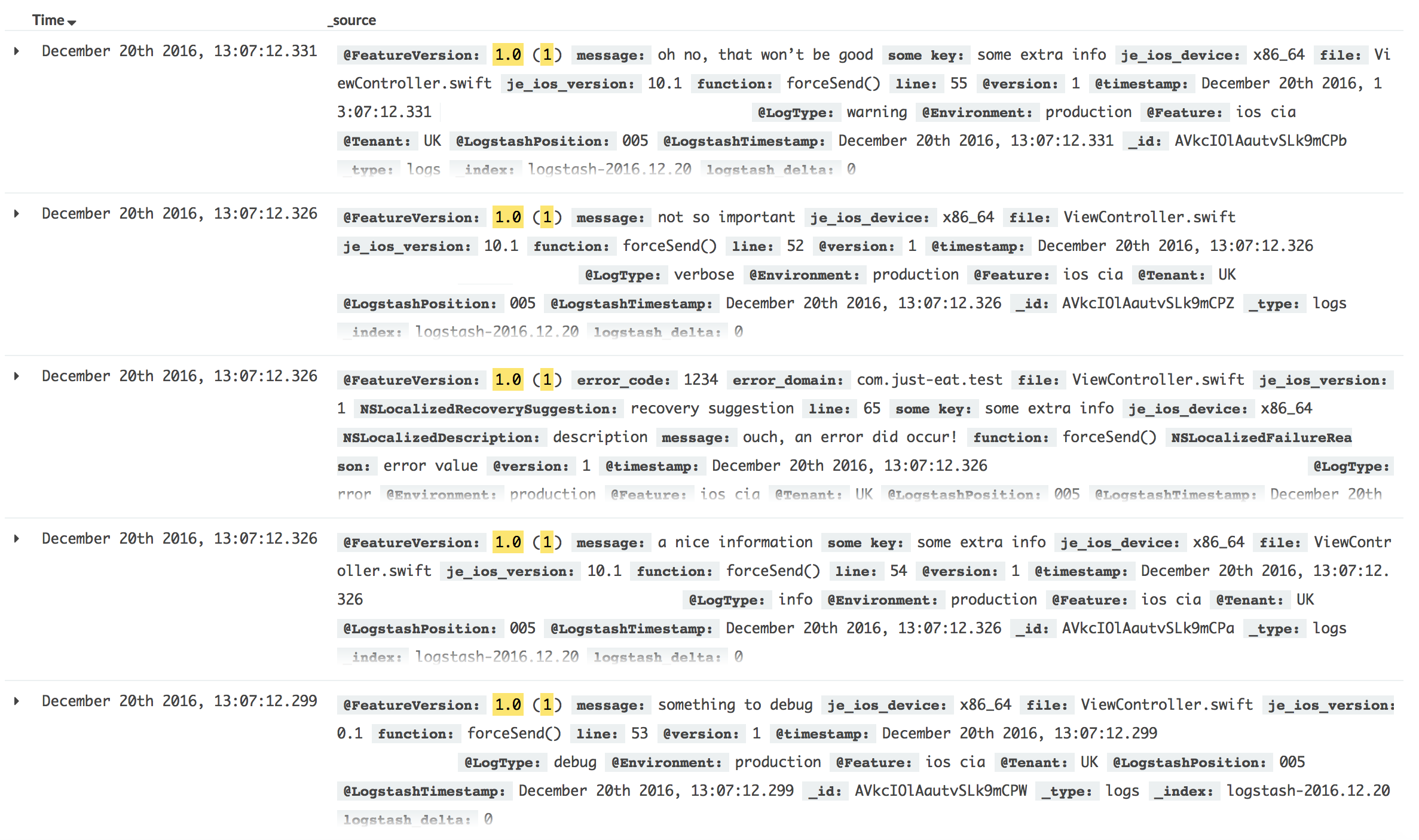justeat / Justlog
Programming Languages
Projects that are alternatives of or similar to Justlog
JustLog
JustLog takes logging on iOS to the next level. It supports console, file and remote Logstash logging via TCP socket with no effort. Support for logz.io available.
Overview
At Just Eat, logging and monitoring are fundamental parts of our job as engineers. Whether you are a back-end engineer or a front-end one, you'll often find yourself in the situation where understanding how your software behaves in production is important, if not critical. The ELK stack for real-time logging has gained great adoption over recent years, mainly in the back-end world where multiple microservices often interact with each other.
In the mobile world, the common approach to investigating issues is gathering logs from devices or trying to reproduce the issue by following a sequence of reported steps. Mobile developers are mostly familiar with tools such as Google Analytics or Fabric.io but they are tracking systems, not fully fledged logging solutions.
We believe tracking is different in nature from logging and that mobile apps should take advantage of ELK too in order to take their monitoring and analysis to another level. Remote logging the right set of information could provide valuable information that would be difficult to gather otherwise, unveil unexpected behaviours and bugs, and even if the data was properly anonymized, identify the sequences of actions of singular users.
JustLog takes logging on iOS to the next level. It supports console, file and remote Logstash logging via TCP socket out of the box. You can also setup JustLog to use logz.io with no effort. JustLog relies on SwiftyBeaver, exposes a simple swifty API but it also plays just fine with Objective-C.
JustLog sets the focus on remote logging, but fully covers the basic needs of local console and file logging.
Usage
JustLog, is available through CocoaPods. To install it, simply add the following line to your Podfile:
New in 3.2.1 JustLog is also available via the Swift Package Manager. Simply import the package via the Xcode UI and import the JustLog package.
pod "JustLog"
Import it into your files like so:
// swift
import JustLog
// Objective-C
@import JustLog;
This logging system strongly relies on SwiftyBeaver. We decided to adopt SwiftyBeaver due to the following reasons:
- good and extensible design
- ability to upload logs to the cloud
- macOS app to analyze logs
A log can be of one of 5 different types, to be used according to the specific need. A reasonable adopted convention on mobile could be the following:
- 📣 verbose: Use to trace the code, trying to find one part of a function specifically, sort of debugging with extensive information.
- 📝 debug: Information that is helpful to developers to diagnose an issue.
- ℹ️ info: Generally useful information to log (service start/stop, configuration assumptions, etc). Info to always have available but usually don't care about under normal circumstances. Out-of-the-box config level.
- ⚠️ warning: Anything that can potentially cause application oddities but an automatic recovery is possible (such as retrying an operation, missing data, etc.)
- ☠️ error: Any error which is fatal to the operation, but not the service or application (can't open a required file, missing data, etc.). These errors will force user intervention. These are usually reserved for failed API calls, missing services, etc.
When using JustLog, the only object to interact with is the shared instance of the Logger class, which supports 3 destinations:
- sync writing to Console (custom destination)
- sync writing to File (custom destination)
- async sending logs to Logstash (usually part of an ELK stack)
Following is a code sample to configure and setup the Logger. It should be done at app startup time, in the applicationDidFinishLaunchingWithOptions method in the AppDelegate.
let logger = Logger.shared
// file destination
logger.logFilename = "justeat-demo.log"
// logstash destination
logger.logstashHost = "my.logstash.endpoint.com"
logger.logstashPort = 3515
logger.logstashTimeout = 5
logger.logLogstashSocketActivity = true
// default info
logger.defaultUserInfo = ["app": "my iOS App",
"environment": "production",
"tenant": "UK",
"sessionID": someSessionID]
logger.setup()
The defaultUserInfo dictionary contains a set of basic information to add to every log.
The Logger class exposes 5 functions for the different types of logs. The only required parameter is the message, optional error and userInfo can be provided. Here are some examples of sending logs to JustLog:
Logger.shared.verbose("not so important")
Logger.shared.debug("something to debug")
Logger.shared.info("a nice information", userInfo: ["some key": "some extra info"])
Logger.shared.warning("oh no, that won’t be good", userInfo: ["some key": "some extra info"])
Logger.shared.error("ouch, an error did occur!", error: someError, userInfo: ["some key": "some extra info"])
It plays nicely with Objective-C too:
[Logger.shared debug_objc:@"some message"];
[Logger.shared info_objc:@"some message" userInfo:someUserInfo];
[Logger.shared error_objc:@"some message" error:someError];
[Logger.shared error_objc:@"some message" error:someError userInfo:someUserInfo];
Please note that metadata such as filename and line number are unavailable in Objective-C.
The message is the only required argument for each log type, while userInfo and error are optional.
The Logger unifies the information from message, error, error.userInfo, userInfo, defaultUserInfo and call-site info/metadata in a single dictionary with the following schema form of type [String : Any] (we call this 'aggregated form'). E.g. in JSON representation:
{
"message": "the log message",
"user_info": {
"app": "my iOS App",
"environment": "production",
"custom_key": "some custom value",
...
},
"errors": [
{
"error_domain" : "com.domain",
"error_code" : "1234",
"NSLocalizedDescription": ...,
"NSLocalizedFailureReasonError": ...,
...
},
{
"errorDomain" : "com.domain.inner",
"errorCode" : "5678",
"NSLocalizedDescription": ...,
"NSLocalizedFailureReasonError": ...,
...
}],
"metadata": {
"file": ...,
"function": ...,
"line": ...,
...
}
}
All destinations (console, file, logstash) are enabled by default but they can be disabled at configuration time like so:
logger.enableConsoleLogging = false
logger.enableFileLogging = false
logger.enableLogstashLogging = false
The above 5 logs are treated and showed differently on the each destination:
Console
The console prints only the message.
File
On file we store all the log info in the 'aggregated form'.
2016-12-24 12:31:02.734 📣 VERBOSE: {"metadata":{"file":"ViewController.swift","app_version":"1.0 (1)","version":"10.1","function":"verbose()","device":"x86_64","line":"15"},"user_info":{"environment":"production","app":"my iOS App","log_type":"verbose","tenant":"UK"},"message":"not so important"}
2016-12-24 12:31:36.777 📝 DEBUG: {"metadata":{"file":"ViewController.swift","app_version":"1.0 (1)","version":"10.1","function":"debug()","device":"x86_64","line":"19"},"user_info":{"environment":"production","app":"my iOS App","log_type":"debug","tenant":"UK"},"message":"something to debug"}
2016-12-24 12:31:37.368 ℹ️ INFO: {"metadata":{"file":"ViewController.swift","app_version":"1.0 (1)","version":"10.1","function":"info()","device":"x86_64","line":"23"},"user_info":{"environment":"production","app":"my iOS App","log_type":"info","tenant":"UK","some key":"some extra info"},"message":"a nice information"}
2016-12-24 12:31:37.884 ⚠️ WARNING: {"metadata":{"file":"ViewController.swift","app_version":"1.0 (1)","version":"10.1","function":"warning()","device":"x86_64","line":"27"},"user_info":{"environment":"production","app":"my iOS App","log_type":"warning","tenant":"UK","some key":"some extra info"},"message":"oh no, that won’t be good"}
2016-12-24 12:31:38.475 ☠️ ERROR: {"metadata":{"file":"ViewController.swift","app_version":"1.0 (1)","version":"10.1","function":"error()","device":"x86_64","line":"47"},"user_info":{"environment":"production","log_type":"error","some key":"some extra info","app":"my iOS App","tenant":"UK","NSLocalizedFailureReason":"error value"},"errors":[{"error_code":1234,"error_domain":"com.just-eat.test","NSLocalizedDescription":"description","NSLocalizedRecoverySuggestion":"recovery suggestion"}],"message":"ouch, an error did occur!"}
Logstash
Before sending a log to Logstash, the 'aggregated form' is flattened to a simpler `[String : Any] dictionary, easily understood by Logstash and handy to be displayed on Kibana. E.g. in JSON representation:
{
"message": "ouch, an error did occur!",
"environment": "production",
"log_type": "error",
"version": "10.1",
"app": "iOS UK app",
"tenant": "UK",
"app_version": "1.0 (1)",
"device": "x86_64",
"file": "ViewController.swift",
"function": "error()",
"line": "47",
"errors": [{
"error_domain": "com.just-eat.test",
"error_code": "1234",
"NSLocalizedDescription": "description",
"NSLocalizedFailureReason": "error value"
}]
}
Which would be shown in Kibana as follows:
A note on Logstash destination
The logstash destination is configured via properties exposed by the Logger. E.g.:
let logger = Logger.shared
logger.logstashHost = "my.logstash.endpoint.com"
logger.logstashPort = 3515
logger.logstashTimeout = 5
logger.logLogstashSocketActivity = true
When the logLogstashSocketActivity is set to true, socket activity is printed to the console:
This destination is the only asynchronous destination that comes with JustLog. This means that logs to Logstash are batched and sent at some point in future when the timer fires. The logstashTimeout property can be set to the number of seconds for the dispatch.
In some cases, it might be important to dispatch the logs immediately after an event occurs like so:
Logger.shared.forceSend()
or, more generally, in the applicationDidEnterBackground and applicationWillTerminate methods in the AppDelegate like so:
func applicationDidEnterBackground(_ application: UIApplication) {
forceSendLogs(application)
}
func applicationWillTerminate(_ application: UIApplication) {
forceSendLogs(application)
}
private func forceSendLogs(_ application: UIApplication) {
var identifier = UIBackgroundTaskIdentifier(rawValue: 0)
identifier = application.beginBackgroundTask(expirationHandler: {
application.endBackgroundTask(identifier)
identifier = UIBackgroundTaskIdentifier.invalid
})
Logger.shared.forceSend { completionHandler in
application.endBackgroundTask(identifier)
identifier = UIBackgroundTaskIdentifier.invalid
}
}
Sending logs to logz.io
JustLog supports sending logs to logz.io.
At the time of writing, logz.io uses the following host and port (please refer to the official documentation):
logger.logstashHost = "listener.logz.io"
logger.logstashPort = 5052
When configuring the Logger (before calling setup()), simply set the token like so:
logger.logzioToken = <logzio_token>
Custom
From 3.2.0 onward JustLog supports a custom destination that can be defined by you. To implement a custom logger, all you need to do is
provide a type that conforms to the CustomDestinationSender protocol to the new overloaded setupWithCustomLogSender() method.
Don't forget to set the enableCustomLogging property to true before calling setupWithCustomLogSender.
class MyCustomDestinationSender: CustomDestinationSender {
func log(_ string: String) {
// send the log somewhere
}
}
let customSender = MyCustomDestinationSender()
let logger = Logger.shared
logger.enableCustomLogging = true
logger.setupWithCustomLogSender(customSender)
Conclusion
JustLog aims to be an easy-to-use working solution with minimal setup. It covers the most basic logging needs (console and file logging) via the great foundations given by SwiftBeaver, but also provides an advanced remote logging solution for Logstash (which is usually paired with Elasticsearch and Kibana in an ELK stack). JustLog integrates with logz.io, one of the most widely used ELK SaaS, placing itself as the only solution in the market (at the time of writing) to leverage such stack on iOS.
We hope this library will ease the process of setting up the logging for your team and help you find solutions to the issues you didn't know you had.
- Just Eat iOS team







